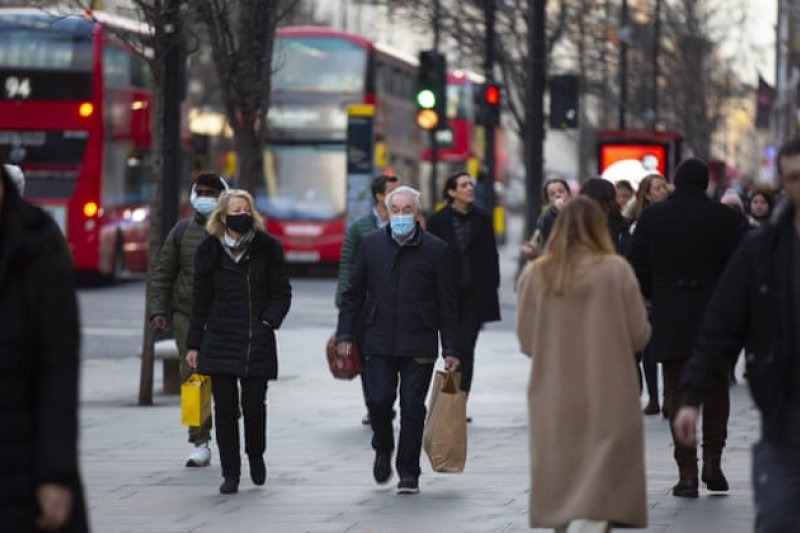All Plan B Covid Restrictions, Including Mask Wearing, to End in England
Boris Johnson has announced the end of all Covid measures introduced to combat the Omicron variant from next week, including compulsory mask-wearing on public transport and in shops, guidance to work from home and vaccine certificates.
The prime minister also said the legal requirement on people with coronavirus to self-isolate would be allowed to lapse when the regulations expired on 24 March, and that date could be brought forward.
Responding for Labour, Keir Starmer said he would back the move as long as it was supported by evidence, saying Johnson must “reassure the public he is acting to protect their health, not just his job”.
Updating MPs in the Commons, Johnson said so-called plan B restrictions would be lifted on 26 January, the pre-set review point the measures introduced in December as Omicron swept across the UK.
Johnson argued that he had taken a “different path” to much of Europe, but that Covid data was “showing that, time and again, this government got the toughest decisions right”.
The swift change has been seen as an attempt by Johnson to placate Conservative MPs angry with him over reports about lockdown-breaching parties in No 10 by introducing a move demanded by many backbenchers, including the Covid Recovery Group.
However, there is concern among some directors of public health that ending all restrictions immediately could be too soon, especially in the north of England, where the Omicron wave hit slightly later than in London.
To cheers from some on the Tory benches, Johnson also announced an immediate end to the need for pupils to wear masks at secondary schools.
“From tomorrow, we will no longer require face masks in classrooms and the Department for Education will shortly remove national guidance on their use in communal areas,” he said.
“In the country at large we will continue to suggest the use of face coverings in enclosed or crowded spaces, particularly when you come into contact with people you don’t normally meet – but we will trust the judgment of the British people and no longer criminalise anyone who chooses not to wear one.”
Replying to the statement, Starmer said Labour “does not want to see restrictions in place any longer than necessary”. The Labour leader said he would back the relaxation “as long as the science says it is safe”.
Teaching unions expressed concern about the sudden lifting of Covid restrictions, in particular the requirement to wear masks in classrooms, warning that many head teachers in England were still seeing widespread disruption to education due to Covid.
Dr Mary Bousted, the joint general secretary of the National Education Union, said: “Schools and colleges are still feeling the impact of Covid. The latest ONS infection survey update shows one in 10 primary age pupils have Covid.
“While the trend amongst secondary aged children is down it is however uncertain, due to the short time schools have been back since the Christmas holidays, that this trend will continue. Such uncertainty could lead to a pronounced risk of increased disruption with children and staff having to isolate.”
The government is due to publish figures for Covid-related absence in schools next week. “The danger is we lift restrictions too quickly before the effects of returning to school are clear,” said Bousted. “This will result in more education disruption which is extremely worrying particularly for pupils taking national exams this year whose education has been so badly disrupted already.”
There was also scepticism that the Covid announcements may have been politically motivated to distract from the prime minister’s predicament. “Rather than announcements aimed at saving Boris Johnson’s job, government should be exercising a duty of care to the nation’s pupils and the staff who educate them,” said Bousted.
“This disruption is at the door of the government who should have got ventilation and filtration solutions in place before Omicron, as advised by Sage, and they should be getting these solutions in place urgently now to ensure interruption of education remains at the minimum.”
(Source: The Guardian)













